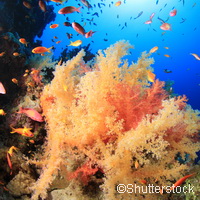Europeans must continue to drive marine biodiversity research: brief
Despites the many advances Europeans have made in marine biodiversity science, it is important that they do not become complacent and stop improving our understanding of this area of science, stresses the European Marine Board. Its future science brief, entitled 'Marine biodiversity: a science roadmap for Europe', presents a roadmap for marine biodiversity research in Europe. The world's oceans provide 95 % of the habitable space on our planet. Various life organisms have found key niches in these areas, and biodiversity plays an important role in ensuring the health of the oceans and their productive ecosystems. These, in turn, help boost the well-being and prosperity of humans as well. Marine life, however, is feeling the pressure - from both climate change and human activities that result in overfishing, ocean acidification and pollution. Over the years, researchers in academic and fisheries institutes and museums have conducted studies focused on marine biodiversity research, generating inventories of marine plants and animals. More than 33,000 species have since been identified in the seas around Europe, with 760 of these identified at the start of the 21st century. The Census of Marine Life, meanwhile, found that there are around 240,000 marine species worldwide, and current estimates of the total number of living marine species ranges from 700,000 to 2.2 million. Millions of microscopic Bacteria or Archaea are not included in these data; the brief notes how we lack an understanding of microbial communities. Commenting on why a policy paper on marine biodiversity is important, European Marine Board chair Dr Kostas Nittis, said: 'In the past 10 years many good biodiversity initiatives were funded and we made a lot of progress, but we are still a long way from a comprehensive understanding of marine biodiversity, how it is changing and what the implications of those changes are for human society.' The EU and EU Member States will continue to struggle to meet internal biodiversity targets and the requirements of global conventions on biodiversity and sustainable development, if they do not receive sufficient support for marine biodiversity and observation in the long term. 'Biodiversity research and observation are imperative, not just to explain what we observe today, but how marine biodiversity will change in the future as a result of natural and human pressures,' said lead author, Professor Carlo Heip of the Royal Netherlands Institute for Sea Research (NIOZ) . 'This requires good science, strong European collaboration, enhanced observing systems, advanced research infrastructures, and effective science-policy interfaces.' Working in cooperation with the European Science Foundation, the European Marine Board provides a pan-European platform for its member organisations to develop common priorities, to drive marine research and to bridge the gap between science and policy. These activities will help Europeans meet marine science challenges and opportunities that will emerge in the future.For more information, please visit: European Science Foundation:http://www.esf.org/
Countries
Netherlands



